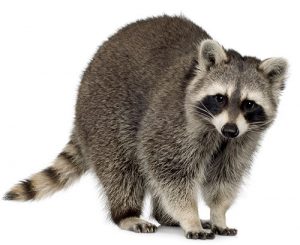Raccoons
 More and more people are coming in contact with raccoons.
More and more people are coming in contact with raccoons.
Considered one of the most intelligent species amongst the delinquents of British Columbia’s wildlife, the raccoon (also spelt racoon) is deemed to have a higher intellect than the domestic cat. With no natural predators they live a blissfully, carefree life and have readily adapted to living with humans, whether we like it or not. Consequently, this makes them one of the most commonly dealt with from our collection of offenders.
Wonderfully brazen, devious, mischievous, nonchalant and audacious, raccoons are famous for their bandit-like qualities of stealing pet food or BBQ dinners, invariably in the presence of their victims (whether dog, cat or human).
Some more facts you should know about raccoons include:
- Often establish dens in chimneys
- Easily manoeuver past a flimsy or poorly installed chimney cap
- Very protective of their young & will tear apart a roof if one of her youngsters is trapped inside
- Seeks shelter under porches or decks
- Dangerous when provoked, trapped or rabid
Family
Procyonidae
Scientific Name
Procyon lotor
Biology
Raccoons defecate at specific sites called latrines. Roundworm eggs in these feces will build up to large numbers at these sites. If humans ingest these eggs at the right time in their development, larval roundworms may migrate inside the body to a site where some harm can be done.
In adults the most severe common problem is migration to the eye where vision loss can occur. In small children, the larvae may migrate to the brain where death can occur. Three or four fatalities have been reported.
In raccoons, the disease can also enter the brain and cause the raccoons to behave abnormally. Eggs are ingested by mice, groundhogs and other rodents, and are in turn eaten by forging raccoons and the cycle goes on. Immature raccoons can also ingest the eggs and become infected.
Behaviour
For a raccoon, urban sprawl is a positive thing as it has given way to an increase in food sources, with plenty of garbage cans and dumpsters to choose from. Raccoons are reckless scavengers, and after raiding and feasting on our trash, they leave a wake of garbage cans and trash strewn all over the place.
If garbage cans and dumpsters are a raccoon’s restaurants, then our houses make for an ideal habitat – with attics or chimneys providing the most comfortable of raccoon boudoirs. As an accomplished acrobat, a raccoon will easily scale fences, walls, roofs, etc. A raccoon’s dexterous, slender, human-like hands and razor-sharp, non-retractable claws enable it to tear holes in a roof to access an attic. But their gatecrashing-tendencies do not just stop there: they will continue to tear insulation paper, rip open ducts, strip insulation off pipes, chew drywall, etc., causing thousands of dollars in damages and oodles of noise!
Your attic or chimney will serve as both a raccoon’s bedroom and toilet. Our gluttonous friends generate large quantities of droppings. This does not bode well for the growing concern of roundworm, as well as leptospirosis. Although unlikely and only very few documented cases, raccoons can also be carriers of the rabies virus. The bigger threat however is pet / raccoon conflict, due to the fact that raccoons can be quite vicious, if provoked.
Control & Prevention
Small children, because of poorer personal hygiene practices and their propensity to put foreign objects in their mouths, are most at risk. Preventing access to raccoon feces is the best way to prevent infection. Raccoons kept as pets should be regularly de-wormed.
Areas contaminated by feces should be disinfected. Hard surfaces such as cages and cement should be flamed with a torch to kill the eggs. Some solvents will kill the eggs, but are impractical to use. Clorox and such will cause the eggs to not adhere to surfaces, but will not kill the eggs. Contaminated soil can be flamed, turned and flamed again. Contaminated organic matter such as straw or wood can be burned or disposed.
Working in contaminated areas requires care. Rubber gloves, disposable clothing and dust masks should be worn.
Raccoon prevention tips:
- Use heavy duty garbage cans with locking lids and place them strategically to prevent tipping
- Keep tree limbs away from rooftops
- Cap chimneys
- Repair holes in walls and roofs
- Close garage and shed doors during the evenings and overnight
- Keep pet food away from cat doors
Need help with Raccoons prevention?
Call Nikol Pest Control at 604-364-3201 for a free estimate.

